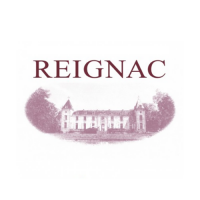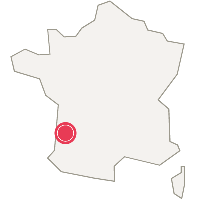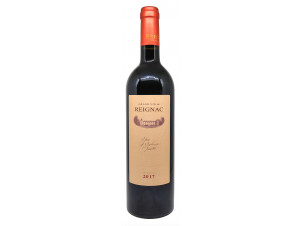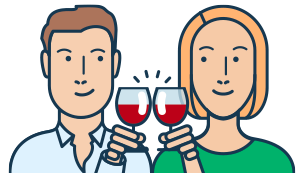You have no items in your shopping cart.
Bordeaux
Château de Reignac
(42 customer reviews)
Since 1990, the Château de Reignac estate has belonged to Yves and Stéphanie Vatelot. With the help of oenologist Michel Rolland, they have gradually worked to establish their wines among the greatest. Today, some of their wines can compete with the best wines of Bordeaux. In addition, for several years now, Château de Reignac has been committed to sustainable agriculture and to an ecological approach to sustainable development. Find out more
 Recommended by
Recommended byJames Suckling - Wine Decider - Jancis Robinson
-

Shipped in
secured packaging -

Garantie anti-casse :
Prise en charge totale
The winemaker
From small Bordeaux wine to grand cru
More than 20,000 years ago, prehistoric men probably lived in the numerous troglodytic habitats that the domain of the Château de Reignac presents. The present castle, on the other hand, was built in the 16th century by Lord Baude de Peyron.
Three centuries later, in 1990, Yves Vatelot and his wife Stéphanie Vatelot bought the property and decided to renovate the castle and the cellars. Assisted by Michel Rolland, a talented oenologist, they put everything in place to make this estate one of the best in Bordeaux.
A few years later, in 1996, the Reignac cuvée was born, ranked among the 50 best Bordeaux wines. Yves and Stéphanie have been at the head of Reignac for more than 30 years and continue to manage this estate with passion and to raise their wines among the greatest.
Terroir specificities
Located in Saint-Loubès, in the Entre-deux-Mers region, this estate covers 135 hectares, including 78 hectares of vines that produce an average of 380,000 bottles per year. Its particular geographical location, between Saint-Emilion and Bordeaux, allows it to benefit from a diversity of terroirs. This richness of terroirs, both clay-limestone but also clay-gravel, allows to produce unique wines of exception.
The vineyard is planted with a majority of Merlot (75%) but also Cabernet-Sauvignon (20%) and Cabernet Franc (5%) in red. The white grape variety mainly grown is Sauvignon Blanc (80%), then Sauvignon Gris (10%) and finally Semillon (10%). The Balthus cuvée is for example one of the emblematic cuvées of this domain. It is a 100% Merlot cuvée that impresses with its power and finesse.
An estate committed to sustainable farming
Since 2009 and the arrival of the new director Nicolas Lesaint, the methods of cultivation are gradually evolving to get closer to an organic culture. In addition, the estate is also committed to a reasoned culture.
This commitment is marked in 2009 by a collaboration with JP Cousinie, for a personalized nutritional follow-up of the vine. Chemical weeding is also abandoned and mechanical equipment of the vine cavaillon is purchased. In 2017, the estate received HVE "High Environmental Value" certification, the highest of the three degrees of environmental certification for farms.
Finally, this adoption for a balanced culture is visible by the practice of de-budding, leaf removal and green harvesting, favoring the development of the fruit and limiting the number of clusters per vine.

10 wines available
between 14.9 € and 284 €
between 14.9 € and 284 €

578 wine's scans
on Twil application
on Twil application
You might like Voir tous les vins de la région
- -25%
- -30%


























 TWIL - Achat de Vin
TWIL - Achat de Vin


